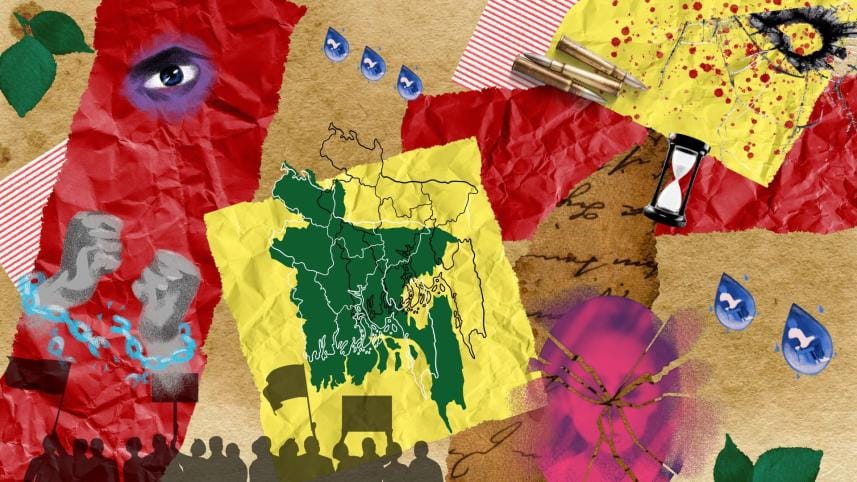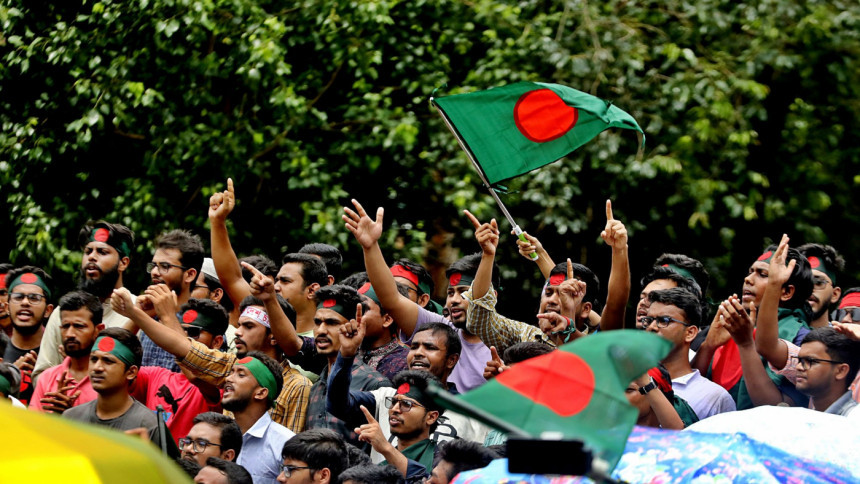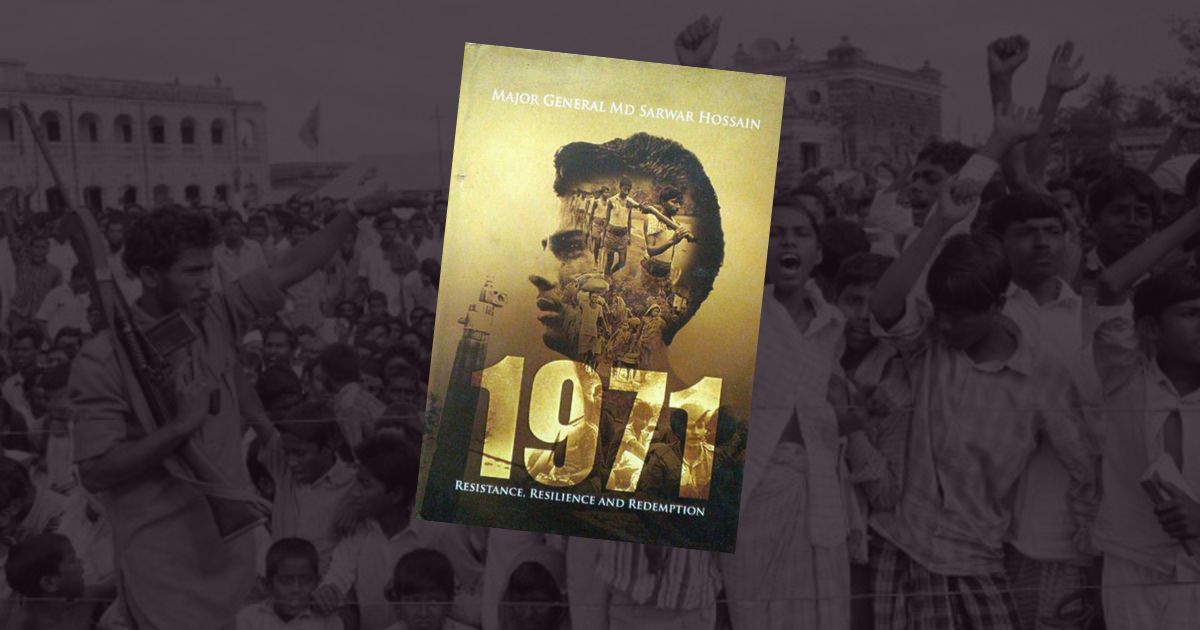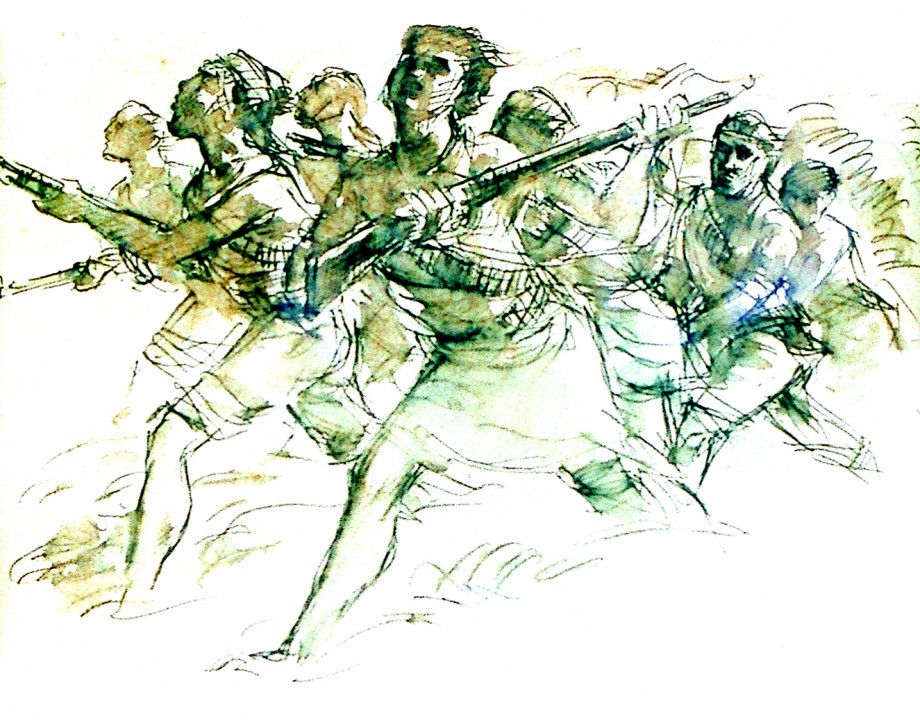Would I be the kind of person to forget history?

Breaking the chains of years of subjugation, we gained independence in 1971. March 26, our Independence Day, is marked by the sacrifice and blood of our martyrs. Our founding aspirations were rooted in equality, human dignity, and social justice. In 1971, democracy was at the core of the spirit of the Liberation War. Similarly, in the 1990s, democratic values were behind the fall of autocratic ruler HM Ershad. Unfortunately, the spirit of democracy and social dignity was sidelined in the following years, which led to public grievances, culminating in the mass uprising of July 2024, which claimed at least 1,400 lives.
The greatest achievement of Bangalees is our independence achieved in 1971. But its backdrop is not limited to 1971. The uprising of 1969, 1990, and 2024—each struggle revolved around the question of our rights and deprivation. Driven by aspirations for democracy, ordinary people shed their blood and endured imprisonment. Yet, like a fleeting mirage, democracy slipped through our grasp.
Our struggle has always been against political domination and social inequality, spanning from British rule to the Pakistani regime. At the core of every struggle was the unwavering desire to live with dignity. Yet, those who rose to power repeatedly neglected the sacrifices of Shaheed Asad, Shamsuzzoha, Noor Hossain, Dr Milon, and Raufun Basunia. In the anti-discrimination movement, martyrs like Abu Sayeed and Mir Mugdho embodied the dreams of democracy and social dignity. To forget these heroes is to forsake the spirit of patriotism, an act that undermines the very essence of 1971.
In this regard, Rabindranath Tagore's poignant words come to mind. He did not see us merely as human beings but as Bangalees—whom he could not fully trust. Perhaps from this anguish, he lamented, "O enchanted mother, you have made seventy million of your children Bangalees, but not made them humans." For the poet, Bangalees lacked the essence of true humanity; they were consumed by self-interest and betrayed public trust. Forgetting history and dismissing sacrifices seemed ingrained in their nature.
I am reminded of the deeply reflective poem "Amar Porichoy" by poet Syed Shamsul Haque, which resonates with Kazi Nazrul Islam's "Samyobadi." Nazrul wrote, "I sing the song of equality, where all barriers and distances have dissolved into one." In Haque's poem, the thousand-year history and heritage of the country are invoked. He begins by touching upon that vast history, then speaks of the river-encircled land of Bangla. At the end of the first stanza, he poignantly asks, "Thirteen hundred rivers ask me, 'Where have you come from?'"
The poet responds to his own question by reflecting on generational legacies, rulers' legacies, religious traditions, and a heritage of revolution. He includes Rabindranath Tagore and Kazi Nazrul Islam as integral parts of this inheritance. His narrative of history and tradition culminates in the figure of Bangabandhu Sheikh Mujibur Rahman. Through his words, the poet unveils Bangalees' dreams and unyielding spirit. He expresses hope with these lines, "We are together, we live together, and together we shall remain./ Erasing all lines of division, we shall paint the image of equality." Finally, he poses a poignant question, "Shall I forget this history? Am I such a person?"
In today's context, this line carries profound significance. The truth is, we forget history—we have already forgotten much of it. At times, we have even erased it in our fixation on the present, and this has come at a great cost. Politicians have spent years mired in futile disputes, neglecting to honour those who fought and sacrificed for our nation. Their achievements have not been preserved or passed down to the next generation, which stands as a national disgrace.
If we too forget history, the future will be bleak. Forgetting history is a symptom of fascism. Sheikh Hasina has been labelled a fascist for disregarding the sacrifices that shaped this nation. Yet, there was a time when the nation was united to overthrow Ershad's autocratic rule. Over the years, however, the ruling class has steadily drifted away from the ideals of the Liberation War. They have manipulated the constitution at will and deviated from accurate historical narratives. They followed the paths of post-'72 Sheikh Mujib and Ershad.
Even if we set aside the struggles of the British era, our fight after the Lahore Resolution and the Partition has been ceaseless. The efforts of Sher-e-Bangla AK Fazlul Huq, Huseyn Shaheed Suhrawardy, Maulana Abdul Hamid Khan Bhashani, Abul Mansur Ahmad, Sheikh Mujibur Rahman, and Tajuddin Ahmad shaped our sense of identity. Inspired by their courage and vision, farmers left their ploughs, and workers abandoned their factories to join the Liberation War. Fishermen, weavers, blacksmiths, potters—all threw themselves into the struggle with full force. With the participation of all classes, the Liberation War transformed into a people's war. We cannot forget them. But our politicians forgot them so easily.
In independent Bangladesh, poet Abul Hasan published his collection Raja Jay Raja Ase in December 1972. In the dedication, he wrote, "My mother/ as helpless as my motherland." From his socio-political experiences, he declared, "This king comes, that king goes / only the colour of clothes changes... / but the days do not." How effortlessly he presented such complex truths. He painted our collective sorrow, vulnerability, and solemn immersion.
From the Kagmari Conference, Maulana Bhashani offered the people of Bangladesh a direct vision of independence. He bid "Assalamu Alaikum" to the West Pakistani rulers. A simple religious greeting became synonymous with the cry for independence. Through that conference began the movements for autonomy and self-determination in what was then East Pakistan. In uniting and awakening the people of this region against imperialist and hegemonic forces, that conference played a profoundly significant role.
Then came the historic March 7 speech, when Bangabandhu called out, "Turn every house into a fortress; resist the enemy with whatever you have." That call mentally prepared most of the people for war. In various places, many ordinary people participated in training. These unarmed civilians remained engaged in war efforts throughout. And finally, victory came to us.
The reality is, we have shamelessly ignored the contributions and aspirations of ordinary people in the Liberation War and belittled our citizens. As a result, true social emancipation has not arrived yet. Over the 54 years of independence, politically marginalising ordinary people has become a hallmark of the powerful. The social dignity of individuals has also been harmed.
Neglecting the people, Ayub Khan used to say, "Development first, then democracy." He implemented development projects: roads, the national mosque Baitul Mukarram, and more. But development could not save him. Ayub Khan's fall sparked the first unified movement by people from both wings of Pakistan. From the very birth of the Pakistani state, East Pakistan endured ethnic oppression, exploitation, and discrimination. Eventually, the people rose.
"The death of a revolutionary does not mean the death of the revolution"—this is a timeless quote by Che Guevara. In the same spirit of 1971, Noor Hossain declared in 1990, "Down with autocracy, let democracy be free." That mass movement succeeded in toppling the military junta, but the trail of autocracy in the country's politics did not change. Initially, the uprising restored democracy, established the rule of law, ensured freedom of speech, expression and the press, the right to vote, and security—five vital wins. But now, none of these remain. Many of those who led the 1990 movement have since changed their principles and beliefs.
History suggests that, had there been a national government instead of a partisan one after 1971, it might have met the people's hopes and aspirations in line with the spirit of the Liberation War. But under successive partisan governments, those were trampled time and again.
We continue to fail the ideals of 1971. Autocratic laws and regulations have been used to keep people confined time and again. Economic, political, social and cultural disparities reached their peak, and in response, the youth rose. And they say, "A storm rages inside my chest, I've bared it—shoot if you must." In that rebellion, they took bullets to the chest in the hope of human liberation. Victory was achieved, but how long can we hold it? Our history is grim. We have a persistent tendency to ignore its lessons. Again and again, we stray from the ideals of the Liberation War. Restlessness cannot lead us to our destination.
I will end with a quote from Serajul Islam Choudhury, "Can we forget 1971 just because we want to?" The Liberation War continues to flow through us.
We have two tasks to undertake. First, we must develop the positive aspects that existed in the past. We must foster the democratic elements, the unity, and the spirit of struggles from the past. Second, we must eliminate the negative aspects—the narrowness, the backwardness—and build a secular, democratic state and society.
Emran Mahfuz is a poet and convener of Abul Mansur Ahmad Smrity Parishad.
Views expressed in this article are the author's own.
Follow The Daily Star Opinion on Facebook for the latest opinions, commentaries and analyses by experts and professionals. To contribute your article or letter to The Daily Star Opinion, see our guidelines for submission.




 For all latest news, follow The Daily Star's Google News channel.
For all latest news, follow The Daily Star's Google News channel. 


Comments